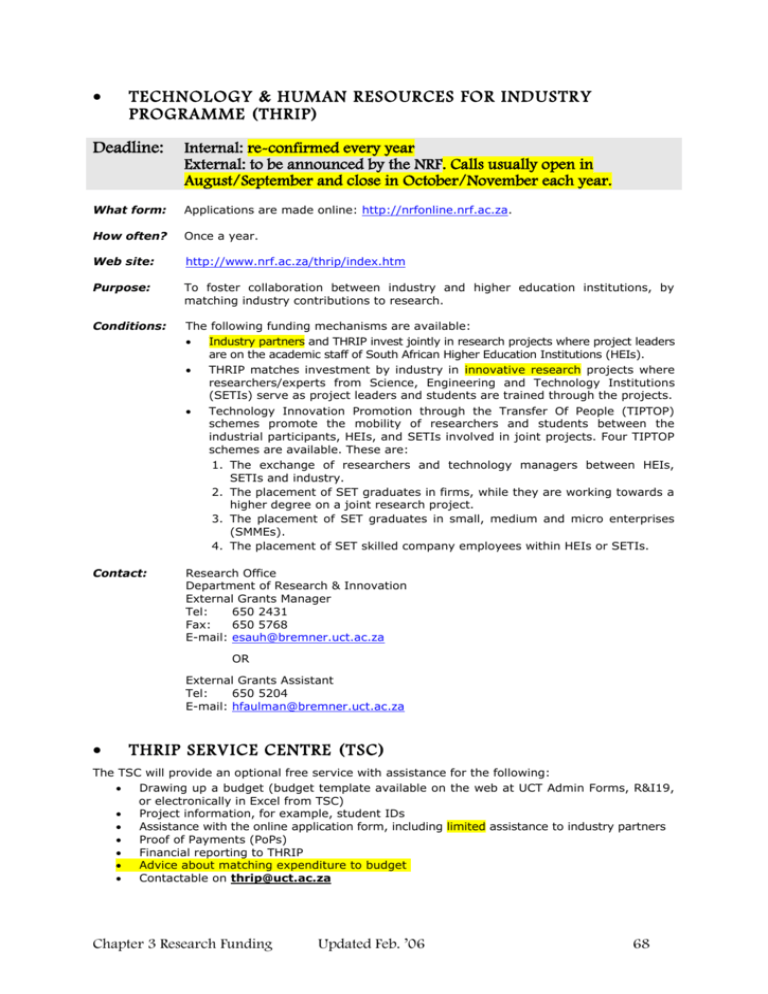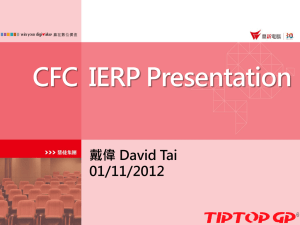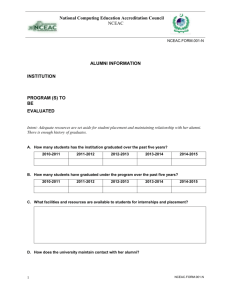Technology & Human Resources for Industry
advertisement

TECHNOLOGY & HUMAN RESOURCES FOR INDUSTRY PROGRAMME (THRIP) Deadline: Internal: re-confirmed every year External: to be announced by the NRF. Calls usually open in August/September and close in October/November each year. What form: Applications are made online: http://nrfonline.nrf.ac.za. How often? Once a year. Web site: http://www.nrf.ac.za/thrip/index.htm Purpose: To foster collaboration between industry and higher education institutions, by matching industry contributions to research. Conditions: The following funding mechanisms are available: Industry partners and THRIP invest jointly in research projects where project leaders are on the academic staff of South African Higher Education Institutions (HEIs). THRIP matches investment by industry in innovative research projects where researchers/experts from Science, Engineering and Technology Institutions (SETIs) serve as project leaders and students are trained through the projects. Technology Innovation Promotion through the Transfer Of People (TIPTOP) schemes promote the mobility of researchers and students between the industrial participants, HEIs, and SETIs involved in joint projects. Four TIPTOP schemes are available. These are: 1. The exchange of researchers and technology managers between HEIs, SETIs and industry. 2. The placement of SET graduates in firms, while they are working towards a higher degree on a joint research project. 3. The placement of SET graduates in small, medium and micro enterprises (SMMEs). 4. The placement of SET skilled company employees within HEIs or SETIs. Contact: Research Office Department of Research & Innovation External Grants Manager Tel: 650 2431 Fax: 650 5768 E-mail: esauh@bremner.uct.ac.za OR External Grants Assistant Tel: 650 5204 E-mail: hfaulman@bremner.uct.ac.za THRIP SERVICE CENTRE (TSC) The TSC will provide an optional free service with assistance for the following: Drawing up a budget (budget template available on the web at UCT Admin Forms, R&I19, or electronically in Excel from TSC) Project information, for example, student IDs Assistance with the online application form, including limited assistance to industry partners Proof of Payments (PoPs) Financial reporting to THRIP Advice about matching expenditure to budget Contactable on thrip@uct.ac.za Chapter 3 Research Funding Updated Feb. ’06 68 The service will not include the day-to-day management of budgets, but will assist in setting up systems in the research group and/or department. TIPTOP OPTIONS Technology Innovation Promotion through the Transfer of People (TIPTOP) represents a set of placement mechanisms to promote mobility of people participating in THRIP projects among the organisations involved in the projects (HEIs; SETIs; and industrial laboratories). These TIPTOP options will be fully embedded in THRIP projects. This means that either an HEI-based or SETI-based researcher will act as leader of a THRIP project in which one or more TIPTOP placements may be included. When TIPTOP placements are made at firms abroad, the researcher/graduate will be contractually obliged to be employed by an organisation in South Africa directly after completion of the TIPTOP contract, and remain in the employ of a South African-based organisation at least for a period equivalent to the length of the TIPTOP contract. TIPTOP Option 1: Exchange of researchers and technology managers between HEIs, SETIs and industry THRIP will provide support for academic researchers in HEIs to work in industrial laboratories for a predetermined period. Reciprocally, THRIP will encourage and support industrial researchers and technology managers to be temporarily seconded to a HEI/SETI to conduct research of direct relevance to the industry involved. In both these instances THRIP and the specific industry involved will contribute to the salary cost of the researcher (whether from industry or an HEI), as well as his/her relocation and travelling cost for the period of the TIPTOP contract, according to the TIPTOP funding formulae. TIPTOP Option 2: Placement of SET graduates in industry, while they are working towards a higher degree on a joint research project This TIPTOP option will support the placement of graduates in SET-related disciplines within industry (either large or SMMEs) on a contract basis for a fixed period, to work on THRIPapproved research or technology development projects within the firms. The graduate should be registered at an HEI for a higher degree in SET. Active mentorship of each graduate by both an academic supervisor and the graduate’s superiors within a firm will form an integral part of this placement scheme. This support will be for a maximum of two years for a master’s degree and three years for a doctoral degree. TIPTOP Option 3: Placement of SET graduates in SMMEs This option is exclusive to SMMEs in South Africa, and would enable the placement of graduates in SET-related disciplines within SMMEs on a contract basis for a fixed period, to a maximum of two years, to work on THRIP-approved research or technology development projects within the firms. Only individuals who have graduated (either undergraduate or post-graduate degree/diploma) not more than five years prior to commencement of the contract would qualify for participation in TIPTOP 3. It is not expected from the graduate to be enrolled for a higher degree (TIPTOP 3 is the only option with this concession). Active mentorship of each graduate by both an academic supervisor and the graduate’s superiors within a firm will be facilitated and monitored by the THRIP secretariat. TIPTOP Option 4: Placement of SET-skilled company employees within HEIs or SETIs This option will support the secondment of graduate employees from industry to HEIs/SETIs to do research within THRIP projects while studying towards a higher degree. The secondments can be for either newly-recruited employees (which THRIP strongly encourages) or longer serving employees. This support will be for a maximum of two years for a master’s degree and three years for a doctoral degree. Chapter 3 Research Funding Updated Feb. ’06 69







